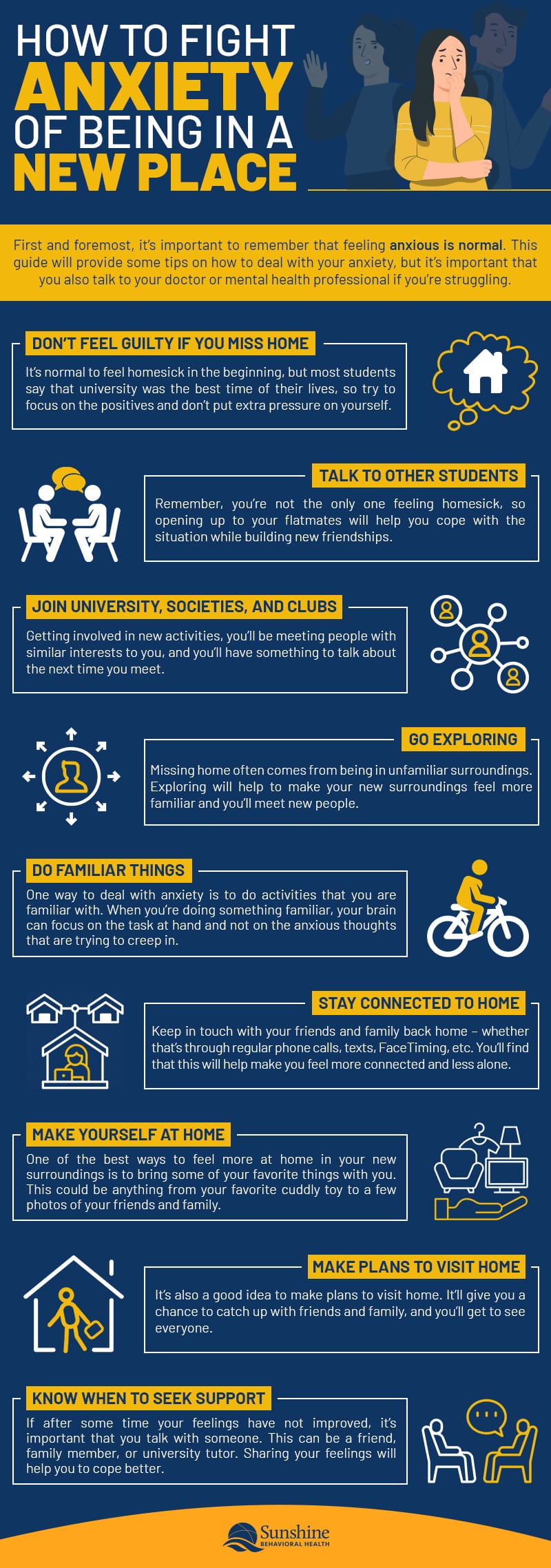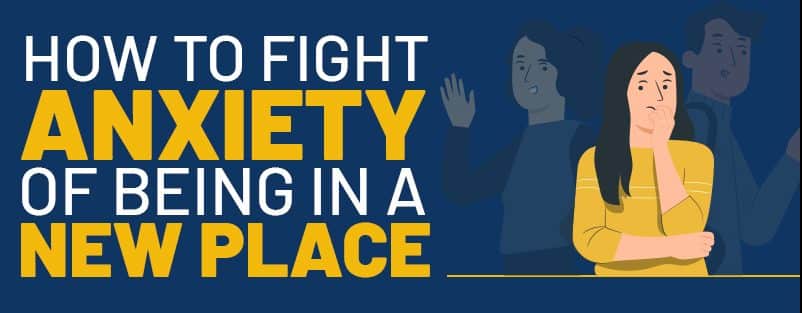According to a survey by the American College Counseling Association, anxiety is the number one mental health issue for college students. In that survey, 41.6% of college counselors said that anxiety was the top issue faced by students.
That’s not surprising, given all the changes and challenges of going away to college. You’re leaving your home and family for the first time, adapting to a new environment, making new friends, and figuring out what you want to do with your life.
For some students, all that can be overwhelming. If you’re already struggling with anxiety, it can be even harder to cope. But don’t worry – there are plenty of things you can do to manage your anxiety and thrive in college.
How to Fight Anxiety of Living in a New Place

There is no step-by-step guide for conquering the anxiety of living in a new place, but a few things can help.
First and foremost, it’s important to remember that feeling anxious is normal. It’s okay to feel homesick initially, and it doesn’t mean that you’re not adjusting well or that you don’t belong at college.
This guide could provide some tips on how to deal with your anxiety, but it’s important that you also talk with a doctor or mental health professional if you’re struggling.
Here are a few things that can help:
1.-Don’t feel guilty if you miss home
It’s normal to feel homesick in the beginning, and it doesn’t mean that you’re not adjusting well or don’t belong at college. These feelings could relate to many worries. You might be afraid that you won’t fit in, or you might miss your friends back home.
But several people say that college was one of the best times of their lives, so try to focus on the positives and don’t put extra pressure on yourself.
2.-Talk with other students
It can be beneficial to talk to other students who are in the same position as you. You can swap stories, tips, and tricks and talk about how others are doing.
Remember, you’re not the only one feeling homesick, so opening up to others can help you cope with the situation while building new friendships.
3.-Join university societies and clubs
One of the best ways to make friends at college is to join one (or more!) of the many societies and clubs that the university offers.
By getting involved in new activities, you’ll be meeting people with similar interests, and you’ll have something to talk about the next time you meet. Not to mention, it’s a great way to distract yourself from thinking about home.
4.-Go exploring
Missing home often comes from being in unfamiliar surroundings. So, to help overcome your homesickness, get out there and explore the surrounding area! This could involve going for walks, checking out the local coffee shops and restaurants, and visiting tourist attractions.
Not only will exploring help to make your new surroundings feel more familiar, but you can also meet people and make friends in the process. If you go exploring with your roommates or classmates, it could be a great way to bond with them.
5.- Do familiar things
Another way to deal with anxiety is to engage in familiar activities. When you’re doing something familiar, your brain can focus on the task at hand and not on the anxious thoughts that want to intrude.
By keeping yourself busy with things that you enjoy or things that relax you, you’re practicing a form of self-care that helps decrease your overall stress levels. Doing things that you’re accustomed to can also help to bring a sense of normalcy into your life when everything else might feel like it’s spinning out of control.
So, if you are feeling anxious, try to incorporate elements of your daily routine or find new activities that will make you feel calm.
6.-Stay connected to home
Although you’re at college to learn and experience new things, it’s important to stay connected to your home life too.
Keep in touch with your friends and family back home – whether that’s through regular phone calls, texts, WhatsApp messages, or even FaceTiming. Such contact can help make you feel more connected and less alone.
7.- Personalize your space
One of the best ways to feel more at home in your new surroundings is to bring some of your favorite things with you. This could be anything from your favorite cuddly toy to a few photos of your friends and family.
It might also help to buy some things for your new room – things that will make it feel like yours. Plants such as cacti can be a great way to brighten up an area. They’re also soothing and don’t take up a lot of precious space.
You could also buy some decorations. Maybe there’s a familiar type of décor from home or a scent that always makes you feel comfortable. Whatever it is, do your best to bring some of those elements with you to your new place. They could help make you feel more at ease and like you’re still at home.
8.-Make plans to visit home
It’s also a good idea to make plans to visit home. A break from school every now and then could be helpful.
Such visits can give you a chance to catch up with friends and family, giving you the chance to see familiar faces.
9.-Know when to seek support
Even after some time, if your anxiety and homesickness haven’t improved, consider talking with someone. This can be a friend, family member, or university counselor. Sharing your feelings could help you to cope better.
Signs You May Need Help
Anxiety can be challenging to face, especially if you don’t know how to identify it. Here are some signs that tell you may need help:
Social isolation
While isolation seems like a good choice to recuperate from anxiety, it’s not the healthiest one. It can actually make things worse.
During isolation, you have no one to rely on for support. You also don’t have any distractions from your anxious thoughts. These conditions could make your anxiety worse.
Emotional outbursts
When anxiety is untreated and unexpressed, it can turn into frustration, which can lead to anger.
If anxiety becomes anger, it’s often because of underlying fear about something else. When people are scared or worried about something, they might choose to be angry as a way to cope.
Physical signs
Anxiety can also affect the body physically. Symptoms can include muscle tension, fatigue, headaches, lightheadedness, irritability, shortness of breath, difficulty swallowing, sweating, chest pains, and stomach aches or digestion issues.
Substance use can also be a sign of anxiety. But many people struggle to connect it with anxiety because they don’t associate drugs or alcohol with feeling bad.
But when someone is struggling with anxiety and uses drugs or alcohol as a way to cope, it can lead to addiction and worsen other mental health issues.
Ways to determine if you have anxiety
Do you think you might be struggling with anxiety? Consider taking one of these self-assessments to learn if you are and to find some resources:
- NAMI Virginia self-assessment
American Institute of Stress self-assessment - Psycom.net self-assessment
Finding Help On-Campus and Off-Campus
On-campus counseling
Finding help to deal with anxiety might require some research.
University health center: The university’s health center is a great place to start. Many such centers have on-campus counselors or the names and contact information for other resources. The center might be called something different on your campus, going by names such as the campus health center, campus counseling center, or the student wellness center.
Psychology/psychiatry department: Your school’s psychology/psychiatry department may be another good place to go. The department might offer free sessions to students or provide access to other resources.
School chaplains: If you’re religious, visiting your school chaplain or another faith-based leader might be a useful option. Private colleges might have chaplains, rabbis, or other religious figures that could offer counseling or other types of help.
Residential assistants (RAs): If you feel like you can’t go to your parents, friends, or other authority figures on campus, talking with your residential assistant (RA) might be a good idea. RAs are trained to deal with such matters, and they might help you find assistance on and off campus.
Seeking outside help doesn’t mean that you’re crazy or weak. It just means that you’re taking care of yourself, and that’s a good thing.
Off-Campus Resources
If you’re not comfortable seeking help from on-campus resources, consider the many off-campus resources available. There are many counseling centers and therapists that specialize in helping college students.
Consider support groups or organizations such Alcoholics Anonymous (AA) or Narcotics Anonymous (NA) if you’re grappling with alcohol-related or drug-related problems.
Whatever route you decide to take, make sure that you do your research first. Different counselors, therapists, and programs have different approaches, so it’s important to find one who feels like a good fit. Don’t be afraid to ask for recommendations or to check out online reviews – your mental health is worth it.
Online Resources
Anxiety and suicide
Mental health matters: anxiety and depression
Managing anxiety
Anxiety support groups
More about anxiety
Sources
Medical disclaimer:
Sunshine Behavioral Health strives to help people who are facing substance abuse, addiction, mental health disorders, or a combination of these conditions. It does this by providing compassionate care and evidence-based content that addresses health, treatment, and recovery.
Licensed medical professionals review material we publish on our site. The material is not a substitute for qualified medical diagnoses, treatment, or advice. It should not be used to replace the suggestions of your personal physician or other health care professionals.







